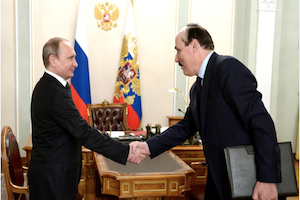Leadership Change in Dagestan
By Natalia Konarzewska
February 20, 2018, the CACI Analyst
In late September, Ramazan Abdulatipov announced his decision to step down from his post as the head of the Republic of Dagestan. Abdulatipov cited his age (71) as the main reason for his resignation, but the change of leadership in Dagestan should be viewed in the context of Russia’s upcoming presidential ballot scheduled for March 2018. Moscow habitually replaces heads of the federal subjects just before or after elections. Likely reasons behind Abdulatipov’s resignation are his poor performance and inability to tackle the republic’s most pressing problems. Multi-ethnic Dagestan is one of the Russian Federation’s most unstable subjects, continuously embattled by economic problems, clan rivalry and the activities of religious militants. On October 3, President Vladimir Putin appointed Vladimir Vasilyev, who does not represent any local ethnic group, to fill the vacant position.

Islamic State-inspired attacks continue in Chechnya
By Huseyn Aliyev
February 7, 2017, the CACI Analyst
On December 17, 2016, a shootout in central Grozny between members of the terrorist organization known as the Islamic State in Iraq and Syria (ISIS) and local security forces claimed the lives of three militants and one police officer. On December 18, a counter-terrorist operation (CTO) launched in the aftermath resulted in the death of four more insurgents, whereas four remaining members of a militant cell were arrested. Three police officers were killed and one injured.
While the confrontation between militants and police in Grozny was only the fourth conflict-related incident in the republic during 2016, it demonstrates that ISIS still has the capacity to target Chechen security forces.
Revival of Islamist insurgency in the North Caucasus?
By Huseyn Aliyev
October 14th, 2016, The CACI Analyst
The last week of August 2016 saw two large-scale Counter-Terrorist Operations (CTOs) in the North Caucasus republics of Kabardino-Balkaria and Dagestan, followed by another CTO conducted in the second week of September. This relatively low-scale increase in military confrontations between militants and security forces in the region nonetheless indicates a steady recovery of non-ISIS Islamist cells, which have been in decline since the emergence of ISIS in the region. While these recent developments may not indicate a revival of the local Islamist insurgency, they indicate that local insurgent jama’ats are still present and active in the region.
The North Caucasus insurgency: weakened but not eradicated
By Emil Aslan Souleimanov
October 6th, 2016, The CACI Analyst
The North Caucasus insurgency has weakened dramatically in recent years. While Chechnya-based jihadist groups now number a few dozen fighters, jamaats operating in Kabardino-Balkaria and Karachay have been nearly wrecked. In Ingushetia, a few insurgent groups remain numbering a couple of dozen members. In Dagestan, the epicenter of the regional insurgents, several jamaats have survived and number around a hundred active members. Indicative of the unprecedented weakening of the North Caucasus insurgency is the jihadists’ inability to elect an amir of the Caucasus Emirate: since the liquidation of the last amir Magomed Suleimanov in mid-August 2015, the jihadist resistance has been beheaded as it lacks a formal leadership. Yet has the regional insurgency indeed been defeated?
The North Caucasus and Russia's Middle East policy
By Stephen Blank
July 1st, 2016, The CACI Analyst
Despite the ongoing terrorist insurgency, Russian officials claim significant progress in pacifying and reintegrating the North Caucasus. For example, in 2015 alone, Ministry of Interior forces in the North Caucasus (VVMVD) allegedly killed over 70 militants. Yet the National Anti-Terrorist Committee expects that the situation in 2016 will show no signs of marked improvement. Moreover, despite many Jihadis’ departure for Syria or Iraq, local insurgent activity has not slackened. In this context, Russia is reaching out to Saudi Arabia, Gulf States and their investment vehicles, as well as Azerbaijan in what may signify more than just a search for foreign investment. Arguably, these moves mark another stage in the recession of Russian power from the North Caucasus.






